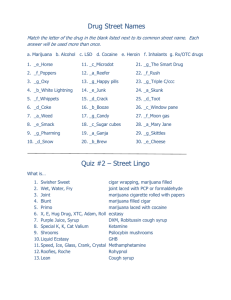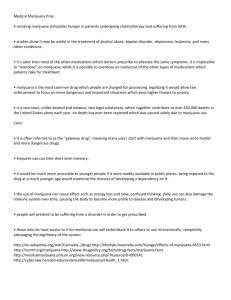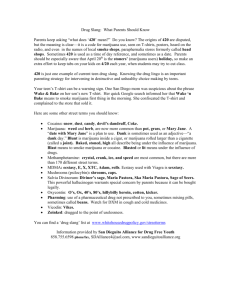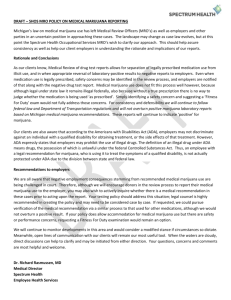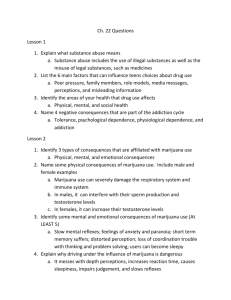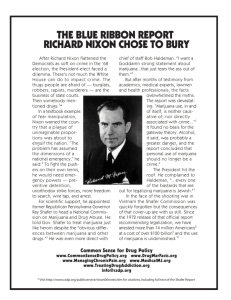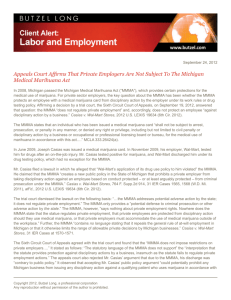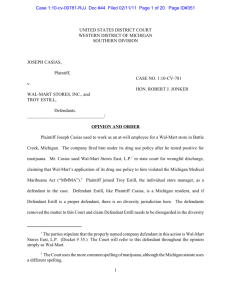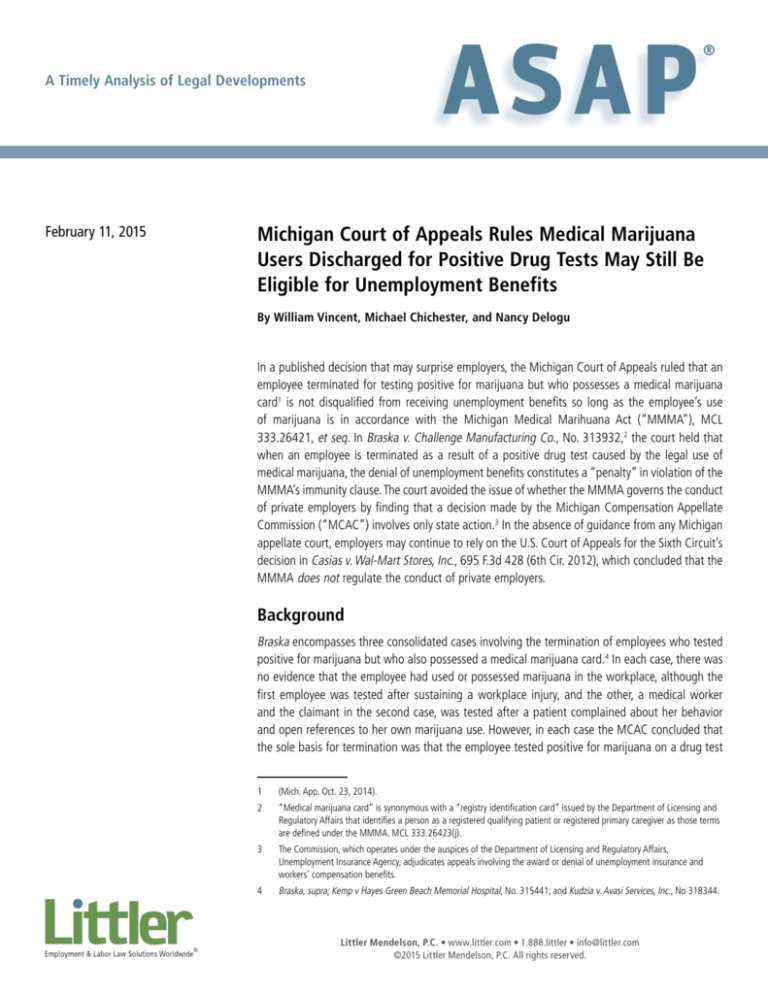
ASAP
A Timely Analysis of Legal Developments
February 11, 2015
®
Michigan Court of Appeals Rules Medical Marijuana
Users Discharged for Positive Drug Tests May Still Be
Eligible for Unemployment Benefits
By William Vincent, Michael Chichester, and Nancy Delogu
In a published decision that may surprise employers, the Michigan Court of Appeals ruled that an
employee terminated for testing positive for marijuana but who possesses a medical marijuana
card1 is not disqualified from receiving unemployment benefits so long as the employee’s use
of marijuana is in accordance with the Michigan Medical Marihuana Act (“MMMA”), MCL
333.26421, et seq. In Braska v. Challenge Manufacturing Co., No. 313932,2 the court held that
when an employee is terminated as a result of a positive drug test caused by the legal use of
medical marijuana, the denial of unemployment benefits constitutes a “penalty” in violation of the
MMMA’s immunity clause. The court avoided the issue of whether the MMMA governs the conduct
of private employers by finding that a decision made by the Michigan Compensation Appellate
Commission (“MCAC”) involves only state action.3 In the absence of guidance from any Michigan
appellate court, employers may continue to rely on the U.S. Court of Appeals for the Sixth Circuit’s
decision in Casias v. Wal-Mart Stores, Inc., 695 F.3d 428 (6th Cir. 2012), which concluded that the
MMMA does not regulate the conduct of private employers.
Background
Braska encompasses three consolidated cases involving the termination of employees who tested
positive for marijuana but who also possessed a medical marijuana card.4 In each case, there was
no evidence that the employee had used or possessed marijuana in the workplace, although the
first employee was tested after sustaining a workplace injury, and the other, a medical worker
and the claimant in the second case, was tested after a patient complained about her behavior
and open references to her own marijuana use. However, in each case the MCAC concluded that
the sole basis for termination was that the employee tested positive for marijuana on a drug test
1
(Mich. App. Oct. 23, 2014).
2
“Medical marijuana card” is synonymous with a “registry identification card” issued by the Department of Licensing and
Regulatory Affairs that identifies a person as a registered qualifying patient or registered primary caregiver as those terms
are defined under the MMMA. MCL 333.26423(j).
3
The Commission, which operates under the auspices of the Department of Licensing and Regulatory Affairs,
Unemployment Insurance Agency, adjudicates appeals involving the award or denial of unemployment insurance and
workers’ compensation benefits.
4
Braska, supra; Kemp v Hayes Green Beach Memorial Hospital, No. 315441; and Kudzia v. Avasi Services, Inc., No 318344.
Littler Mendelson, P.C. • www.littler.com • 1.888.littler • info@littler.com
©2015 Littler Mendelson, P.C. All rights reserved.
ASAP
™®
LittlerMendelson,
Mendelson, P.C.
• 1.888.littler
info@littler.com
Littler
P.C.••www.littler.com
littler.com • 1.888.littler
• •info@littler.com
administered in accordance with the employer’s established policies.5 The MCAC found that the positive drug tests disqualified the employees
from receiving unemployment benefits under Section 29(1)(m) of the Michigan Unemployment Security Act (“MUSA”), which provides in
pertinent part:
(1) Except as provided in subsection (5), an individual is disqualified from receiving benefits if he or she:
***
(m) Was discharged for illegally ingesting, injecting, inhaling, or possessing a controlled substance on the premises
of the employee; refusing to submit to a drug test that was required to be administered in a nondiscriminatory manner;
or testing positive on a drug test, if the drug test was administered in a nondiscriminatory manner . . . .
[MCL 421.29(1)(m) (emphasis added)].
All three employees appealed their disqualification to the circuit court, which reversed the MCAC’s decision in each instance.6 The Department
of Licensing and Regulatory Affairs (the “Department”) appealed, requiring the Court of Appeals to decide whether the State could deny
unemployment benefits to an employee who, after using medical marijuana in accordance with the MMMA, was discharged for testing positive
for that substance.
The Court of Appeals’ Decision
To decide this novel issue, the court turned to Section 333.26424 of the MMMA,7 which provides broad immunity from arrest, prosecution or
penalty to persons who possess a medical marijuana card and use medical marijuana in accordance with the Act:
A qualifying patient who has been issued and possesses a registry identification card shall not be
subject to arrest, prosecution or penalty in any manner, or denied any right or privilege, including but not
limited to civil penalty or disciplinary action by a business or occupational or professional licensing board or bureau,
for the medical use of marijuana in accordance with this act. . . .
[MCL 333.26424 (emphasis added)].
Noting that the MMMA does not expressly define the term “penalty,” the court looked to case law and the dictionary to define “penalty” as
“a punishment imposed or incurred for a violation of law or rule . . . something forfeited. . . .”8 Applying this definition to the facts of each
case, the court concluded that the State’s denial of unemployment benefits under Section 29(1)(m) of the MUSA constituted a “penalty” under
the MMMA imposed by the state on the employees solely for their medical use of marijuana. The court emphasized that the only reason the
MCAC disqualified claimants from receiving benefits was because they had tested positive for marijuana, yet there was no evidence that any
of the claimants had failed to abide by the MMMA in their marijuana use. The court also concluded that because the employees’ positive test
results were caused by their medical use of marijuana, the MMMA’s broad preemption clause—which states that “[a]ll other acts and parts
of acts inconsistent with [the MMMA] do not apply to the medical use of marijuana as provided for in this act”—prohibited the MCAC from
denying unemployment benefits based on those results.9
By finding that the MCAC’s decision to deny unemployment benefits involved only state action, the court avoided the more significant issue
of whether the Sixth Circuit correctly held in Casias that the MMMA does not apply to private employers. However, the court noted that “the
Sixth Circuit did not discuss in any detail the impact of the phrase ‘including but not limited to’ [contained in the MMMA’s immunity clause] in
determining that the MMMA was limited to business, occupational, or professional licensing boards or bureaus” and did not apply to private
5In Braska, the employee was a material handler/hi-lo operator who was tested after injuring his ankle at work. In Kemp, the employee was a CT technician who was tested after a
patient complained about her erratic behavior. In Kudzia, the employee was an in-home service technician who was randomly tested as part of the company’s drug-free workplace
program.
6
Id.
7
Id. at p. 11.
8
Id. (citation omitted).
9
Id.
2
ASAP is published by Littler Mendelson in order to review the latest developments in employment law. ASAP ® is designed to provide accurate and informative information and should not be considered legal advice.
©2015 Littler Mendelson, P.C. All rights reserved.
®
ASAP
™®
LittlerMendelson,
Mendelson, P.C.
• 1.888.littler
info@littler.com
Littler
P.C.••www.littler.com
littler.com • 1.888.littler
• •info@littler.com
employers.10 Thus, while practitioners may continue to rely on Casias for the proposition that the MMMA does not prohibit an employer from
terminating any employee who tests positive for marijuana, the issue of whether the MMMA applies to private employers—and if so, to what
extent—remains undecided in Michigan.
Implications for Employers
Following the decision in Braska, an employee in Michigan who tests positive for marijuana but who possesses a medical marijuana card
will not be disqualified from receiving unemployment benefits so long as the employee’s use of marijuana is in accordance with the MMMA.
Consequently, Braska reinforces the importance of using pre-employment drug testing to “weed-out” applicants who use marijuana—legally
or illegally—before those applicants become employees.
Although private employers are not required to exempt employees who use medical marijuana from complying with any drug testing or drugfree work place policy, a company that terminates such an employee solely because he or she tested positive for marijuana can expect to see a
charge to their unemployment account if the employee applies for unemployment, meets certain threshold requirements, and is not otherwise
disqualified from receiving benefits. It may be possible for employers to demonstrate that a particular employee was impaired by marijuana at
work by amending their drug testing protocols. In evaluating the second claimant’s claim, the court rejected the Department’s argument that
the second claimant tested positive for marijuana at work and that her discharge was akin to testing positive for any other intoxicating or illegal
substance, such as Vicodin, at least partially because she tested positive for a substance known as “11–carboxy–THC,” which is a metabolite
of marijuana that has no pharmacological effect on the body. Another type of test, such as a saliva or blood test, could show active marijuana
in an individual’s system, which might lead to the conclusion that the employee was under the influence of the marijuana while working.
Employers should also approach with caution any issue involving an employee’s use of medical marijuana and consult with a qualified attorney
to address such issues. To date, Casias remains the only case analyzing whether the MMMA regulates the activities of private employers, but
because Casias involves a federal court interpreting Michigan law, its holding is not binding on Michigan courts. As such, the law in this area
remains unsettled, and footnote 7 of the Braska decision suggests that if the Court of Appeals has the opportunity to decide whether the
MMMA does apply to private employers, it may take a more expansive view of the Act’s scope than the Sixth Circuit did in Casias.
William Vincent is a Shareholder, and Michael Chichester is an Associate, in Littler’s Detroit office and Nancy Delogu is a Shareholder in the Washington D.C. office. If you would
like further information, please contact your Littler attorney at 1.888.Littler or info@littler.com, Mr. Vincent at wvincent@littler.com, Mr. Chichester at mchichester@littler.com, or
Ms. Delogu at nndelogu@littler.com.
10 Id. at p. 13, n.7.
3
ASAP is published by Littler Mendelson in order to review the latest developments in employment law. ASAP ® is designed to provide accurate and informative information and should not be considered legal advice.
©2015 Littler Mendelson, P.C. All rights reserved.
®


![[H1]Researching Society with MicroCase Online](http://s3.studylib.net/store/data/007737973_2-9d35b9e42208c660471ccaa373bd3b78-300x300.png)
